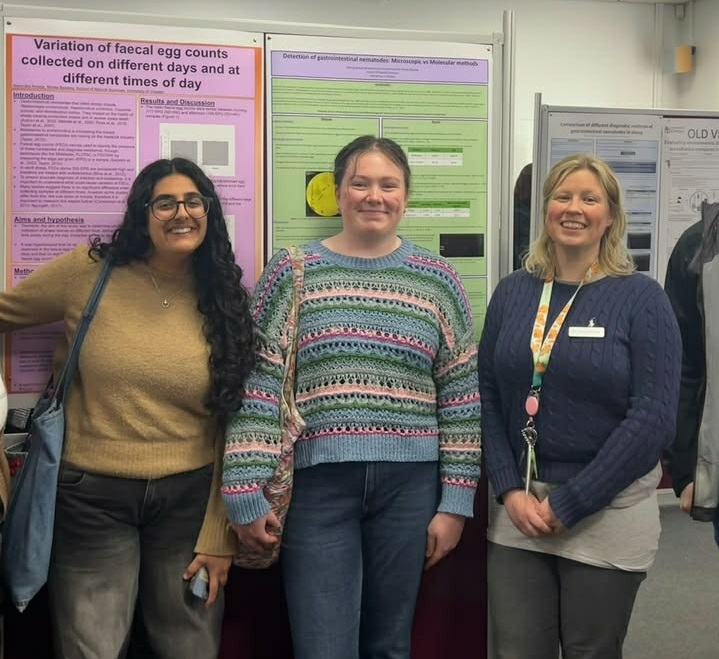Presenting as an Undergraduate – My First Research Conferences
Recent Bioveterinary Science graduate Davina shares her experiences presenting her undergraduate work at conferences.

I’m Davina Raiyat, and I’ve just completed my Bioveterinary Science degree at the University of Chester! Through my degree I developed a passionate interest for parasites, particularly ones that infect sheep. As such, for my dissertation project I compared the effectiveness of microscopic and molecular diagnostic methods to detect gastrointestinal nematodes in sheep faeces. My work meant that I had the opportunity to present my research at two conferences!
2025 School of Natural Sciences Research Conference
In March, I decided to present my dissertation findings with a poster and one minute presentation at the University of Chester, School of Natural Sciences Conference. When my dissertation supervisor, Dr Nicola Beesley, first asked me if I wanted to present, I felt nervous as I had never made an academic poster before and I was also anxious about speaking in front of a large group of people. Despite this I still decided to present as I thought it would be really good experience and it would help me gain confidence in myself. Around the same time as the conference, I had an assignment due which also involved creating an academic poster; this helped immensely when preparing my poster for the conference as I could refer back to the advice given in my assignment support sessions.
During the conference, there was a wide variety of talks from lecturers in the School such as research perspectives on animal welfare in transport and at slaughter from Dr Kelly Gouveia, and the effects of climate change on endemic bird species in the Caribbean from Dr Matt Geary. There were also loads of talks from undergraduate, masters and PhD students including the risk of Toxoplasma gondii in raw pet food compared to non–raw pet food, the impact of storage conditions on equine strongyle egg counts, and how forest types and environmental factors can impact the distribution of bats in Grenada. I found all of these presentations so interesting and thoroughly enjoyed listening to how peoples’ interests have led them to conduct impactful research.
When I was delivering my presentation, I was less anxious than I anticipated, as there were familiar faces in the crowd like my lecturers and other students from my course. This created a supportive and relaxed atmosphere for everyone presenting. After the presentations, we were given an opportunity to discuss our posters. This helped me to gain confidence in my ability to network as I had never done it before.
British Association for Veterinary Parasitology Early Career Research Meeting 2025
Shortly after this, my supervisor suggested that I do a short presentation at the British Association for Veterinary Parasitology. I definitely felt more confident agreeing to this as I had prior experience from the School of Natural Sciences conference. However, I was quite intimidated as this was an external conference attended by experienced researchers who were highly knowledgeable in veterinary parasitology, so the thought of presenting my undergraduate dissertation findings to them was a bit scary. Nevertheless, I recognise that this was an exciting opportunity! To help prepare, Nicola gave me advice on my presentation, and I also practiced it in front of my friends and family.
I found this conference very insightful as researchers from all over the UK gave talks, including the University of Liverpool, University of Glasgow and Aberystwyth University. These talks covered a wide range of interesting topics, from parasite control strategies in livestock and wildlife to host-parasite interactions and anthelmintic resistance.
This conference also provided other networking opportunities including a parasite quiz! This was a really fun and relaxed way to talk to people and get to know about their research and how they got to where they were. They also gave me advice on where to look for further research and career opportunities.
These experiences have made me feel less nervous about my future post-graduation as I saw what other people, who were once undergraduate students, had achieved.
Even though, I was very anxious about presenting my research I am really happy that I got the opportunity to participate in both conferences; I now feel more confident and inspired to look for postgraduate research opportunities into livestock parasitology.
My top tip for future students is to have confidence in yourself and the research you are doing!
Want to find out more?
Visit our School of Natural Sciences pages to find out about all of our degrees, including Bioveterinary Science. Alternatively, you can find out about opportunities to visit us here.